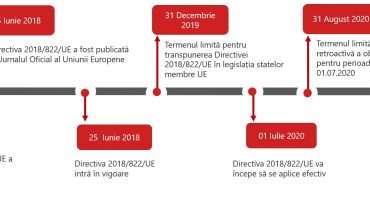Work from home tax consequences / Work from anywhere / Remote working taxation
article published on 28 August 2022
Work from home during the pandemic
From the moment the COVID-19 pandemic began, the way employees work has radically changed. Working from the office has been easily replaced with „working from home” and soon thereafter with „working from anywhere”.
The relaxation of the restrictive measures applied by the governments of each state offered the possibility for the majority of employees to choose to move their activity away from the daily routine during the pandemic.

So, the „new office” nowadays can be located hundreds or even thousands of miles away as long as the internet connection is adequate for performing daily activities. It sounds tempting, but the “work from home” / “work from anywhere” mirage can generate a series of tax and legal challenges that must be taken seriously by both employees and employers.
Having the above in mind, it is important to analyze the circumstances in which the salary income earned from the employer in the state of origin may become taxable in the country where the individual actually performs the day-to-day duties (i.e. the host state).
Work from home tax – important factors to consider and analyze
Among the main issues that should be taken into consideration from a tax perspective are regarding:
- the period of time the person is performing the day-to-day work related duties across the borders of employer / home state;
- the country with which the individual’s personal and economic relations are closer the period of presence abroad;
- the type of place abroad used by the individual to perform the day-to-day duties (for example a rented house, a property owned or hotel accommodation).
The presence of the individual for more than 183 days across state borders, the fact that the individual is accompanied by the family or has a place available for use in the host location across borders at any time, are factors that could trigger tax residence in the respective state and the taxation of salary income from the first day of presence in that state.
Ask a complimentary free 15 minutes call back from one of our work from home tax specialists
Fill in the form below to receive a call from our specialists in work from home / work from anywhere taxation:
Work from home tax implications

If not careful on taking into account and analyzing the above factors, work from home taxation could be triggered not only on salary income from the host location, but also on personal income worldwide, such as interest, dividends, rental income, capital gains, earned not only from the home or host locations, but also from any other countries from which the individual may derive revenue from.
It is important to consider all these implications particularly having in regard the high interest the states across the world are showing to this subject, starting with the European Union that discussed in a plenary session on July 2022 the matter of work from home taxation and particularly work from anywhere taxation.
Implication #1 – Having to analyze and know local tax regulations in both home and host states
The legislation of the state where the employee plans to perform the day-to-day work related duties, as well as the double tax treaty and the totalisation agreement on social charges, in place between the respective country and the home country should be carefully analysed.
Implication #2 – Having to determine the tax obligations in both home and host state
By studying the legislation would help to determine the income tax and social charges obligations of the parties involved, employee or employer, and avoid potential tax exposures and double taxation on the same income.
Implication #3 – Having to file personal income tax statements in both the host and home locations
If you’re permanently relocated across state borders during the pandemic, you may probably have to file tax returns in both states.

Even temporary relocations for six months or longer may require tax returns to be filed in two states. It is likely that states will later on be monitoring these moves of people across states lines closely in order to recover lost revenue.
For instance, in EU member states, working from home in another state may generate an obligation for the employer to apply for social security reporting and payment in the host country where the employee is performing the day-to-day duties.
On top of this, additional obligations to submit various statements may arise as per the local legislation of the state in which the employee is carrying out the day-to-day work related activities.
Implication #4 – Potential permanent establishment risk for the employer
Another significant topic in cross-border remote work agreements is the potential risk of the permanent establishment that the home employer may face in the host state (i.e. the employer may be forced to determine the amounts of profits generated by that specific employee while working across state borders and pay corporate income tax on those profits in the host country).
Implication #5 – Potential double taxation of the same income
Having all the above in regard, particularly in cases of gross-negligence or improper compliance, both employers and employees have to consider that the probability of their revenues being double taxed is significant.
From “work from home” to “work from anywhere”
While the “work from home” concept has become paramount during the actual pandemic times, the “work from anywhere” is increasingly growing in importance as a direct consequence of the pandemic and after the companies convinced themselves about the possibility of having permanent employees working from them 100% virtually and eventually from a different state than the one where the company has its tax residence.
The request for “work from anywhere” can come both from employees who want to change their home office, and from companies that consider global mobility policies in virtual work for new employees.
A virtual assignee does not physically relocate and works for the benefit of the company with a residence in home state from another state. Such a virtual assignment can bring several benefits such as diminishing friction in the recruitment process by reducing concerns about personal and family health and such as reducing immigration risks.
Work from anywhere can also generate challenges from a tax perspective
This type of virtual assignment (i.e. work from anywhere) however can also pose a significant number of challenges, even from a tax point of view, where several factors must be taken into account such as the risk of permanent residence, the implications of income tax and social changes, individual tax residence.
It is recommended for the employers to implement a pre-established framework for working remotely / from anywhere, through business or even personal requests, within which to set specific rights and obligations of all parties involved and to bring information about the tax aspects, but also the legal aspects (i.e. for the employee, host employer, home employer).
Work from home and work from anywhere has forced certain states to reconsider their taxation systems
The states that have acknowledged these increasing phenomenon have decided to alter their legislation in order to facilitate a process through which foreign citizens can live and work temporarily on their territory.
Some of these states are popular tourist destinations, which try to partially compensate for the losses caused by the presence of the pandemic. These countries include Barbados, Bermuda, Estonia and Georgia.
Mind for the differences between work and tourism immigration rules
The immigration rules for work in the states where the employees choose to temporarily change their location must be carefully analyzed because in many cases they differ significantly from the rules applicable to tourism, the latter being more restrictive.
Work from home and work from anywhere – the Romanian case study
The relaxation of the pandemic restrictive measures enforced by the Romanian authorities led to employees experiencing shifting their activity as far as possible from their adapted daily routine.
Even if these changes are obvious for just about anyone working in private sector, Romania still does not offer tax related or immigration related facilities in this respect, specific to remote work (be it work from home or work from anywhere), excepting the digital nomad visa.
The flat salary tax rate of 10% in Romania could however be attractive for foreign employees. Hence, such a work from home / work from anywhere working model in Romania could also attract a tax residence, with only 10% tax on most types of personal worldwide income.
At opposite poles, in the case of virtual assignments (work from anywhere) to Romania, the salary income derived by a foreign tax resident for activities performed remotely from abroad (where the employment is exercised) for the benefit of a Romanian entity should not be subject to income tax or social charges in Romania.
The right of taxation should normally stay with the home country, where the employment is exercised. There are no specific provisions in Romanian tax law on virtual assignments and, consequently, the general ones should be observed, closely together with the ones from the double tax treaties.
Ask a complimentary free 15 minutes call back from one of Romanian work from home tax specialists
Fill in the form below to receive a call from our Romanian specialists in work from home / work from anywhere taxation:
The takeaway – analyze the work from home tax consequences or work from anywhere tax consequences
Because remote work demands are here to stay, from people to organizations alike, the companies should properly prepare themselves for the shift from „working from home” to „working from anywhere”.
Moreover, it is highly advisable for companies to take into account the different domestic laws and double taxation treaties among the host and home states, social security coordination agreements and OECD guidelines in order to avoid any potential issues (e.g. such as double taxation).
****************************
An article by Viorel Sbora
Direct line: +40 728 095 223
Direct email: viorel.sbora@atipics.ro














